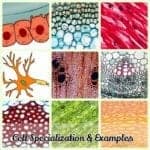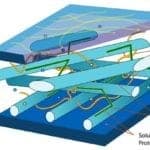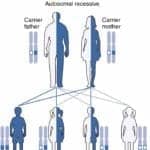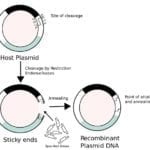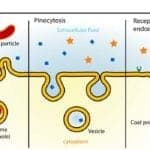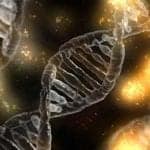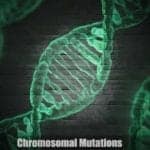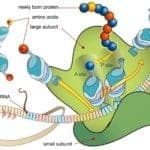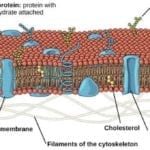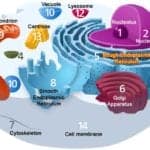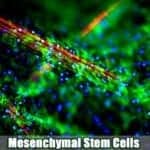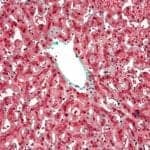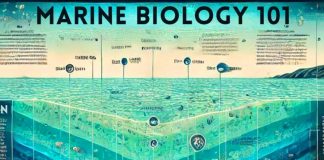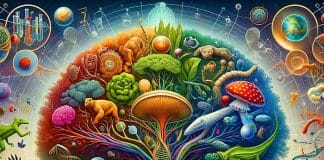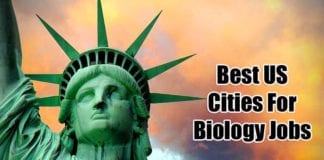top - search results
If you're not happy with the results, please do another search
Cell Specialization: Mechanisms, Examples, & Significance
Cell specialization is the process by which cells evolve to cells with specific functions. Let's explore its mechanisms, examples and significance here.
How To Become A Neurologist?
A neurologist is a medical specialist who treats the disorders of the nervous system. Explore how to become a neurologist, required education & Salary Info.
Cell Wall: Types, Structure, and Functions
The cell wall is the structural layer encircling the cell membrane. Discover the different types of cell walls, their structures, and their functions.
Mechanisms Of Evolutionary Change: The Founder Effect
Discover here what the Founder effect is and how it is used to describe the origins of new species (that are genetically distinct) from larger populations.
Autosomal Recessive Inheritance: Principles, Patterns, & Associated Disorders
Autosomal recessive inheritance is a condition when carrier parents have a 25% chance of having a child affected with a particular genetic condition.
How To Become An Oncologist?
An oncologist deals with the diagnosis and treatment of cancer. Explore how to become an oncologist, types of oncologists & educational qualifications here.
How To Become A Medical Geneticist?
A Medical Geneticist consults patients about various genetic disorders. Learn how to become a medical geneticist, educational qualifications & salary info.
How To Become An Internal Medicine Specialist?
An internal medicine specialist is a medical practitioner who treats adult patients. Explore how to become an internal medicine specialist & requirements.
How To Become A Medical Examiner?
Medical examiners are specialists that undertake post-mortem examinations of died people. Explore how to become a medical examiner, required education, anticipated salary information.
Recombinant Proteins
Recombinant proteins are translated products of the expression of recombinant DNA in living cells. Learn its definition, history, two methods & applications.
Pinocytosis: The Science of Cell Drinking
Pinocytosis is the process by which cells takes in extracellular fluid & dissolved solutes. Learn the difference between Phagocytosis and Pinocytosis here.
Explore Ecological Pyramid: 3 Major Types and Limitations
Ecological pyramids serve as the representation of the relationship among organisms in an ecosystem. Learn their overview, 3 major types & limitations here.
The Histology of the Pseudostratified Columnar Epithelium
The epithelium, the outermost layer of the body surface, consists of a layer (or layers) of similar cells that are bound closely together. Learn about the pseudostratified columnar epithelium (anatomy, types & functions) and find out what makes it unique from other epithelia in the body.
Errors In Meiosis: The Science Behind Nondisjunction
Nondisjunction: Let's explore the science behind how an offspring acquires the wrong number of chromosomes through a deleterious phenomenon during meiosis.
What Do Llamas Eat?
Llamas are camelids with notable long necks and legs, with incisors protruding and split upper lips. Explore what do llamas eat, types and what eats llamas.
How To Become A Geriatrician?
A geriatrician is a medical specialist that deals specifically with elderly patients. Learn how to become a geriatrician, required education & salary info.
Overview of Chromosomal Mutations, Types & Examples
Chromosomal mutations are any alterations or errors that occur on a chromosome. In living organisms, mutations occur at one in every ten million cell replications. Explore what happens when a chromosome encounters such changes in its structure, number, and type. Learn the pros and cons of chromosomal mutations.
How To Become A Maxillofacial Surgeon / Oral Surgeon?
Oral and maxillofacial surgeons treat several disorders and traumas of the head, neck, jaws, and face. Explore how to become an oral surgeon in the USA.
From mRNA To Protein: Overview of Translation Biology
Get an overview of translation biology - the process where the encoded info in mRNA is translated into amino acids and proteins (Protein Synthesis Steps).
How To Become A Hematologist?
A hematologist is a medical specialist that deals with blood disorders. Explore how to become a hematologist and educational requirements & salary info here.
How To Become An Intensivist?
Intensivists are medical specialists who treat critically ill patients in need of intensive care. Explore how to become an intensivist & required education.
How To Become An Infectious Disease Specialist?
An infectious disease specialist is a medical doctor who diagnoses and treats infectious diseases. Explore how to become an infectious disease specialist.
25 Most Known Exotic Flowers
Exotic plants, when introduced to a foreign place, have the tendency to overgrow and dominate. Listed are the 25 most known exotic flowering plant species.
How To Become A Neonatologist?
A neonatologist is a medical specialist that exclusively works with newborns. Learn how to become a neonatologist, academic requirements & salary info here.
How To Become A Nephrologist?
A nephrologist is a medical specialist that specializes in kidney diseases. Explore how to become a nephrologist, educational qualifications & salary info.
15 Best Dinosaur Fossil Discoveries of All Times
Discover the 15 most famous dinosaur fossils of all times. Fossils that remarkably improved the scientific study of dinosaurs and prehistoric life. Dinosaurs have already gone extinct but much information about them still remain-because of their fossils. Fossils don’t easily degrade or decompose; hence they are a good source of evidence about the prehistoric life on the planet.
The Science Behind Dehydration Synthesis and Hydrolysis
Here is the science behind how water facilitates the building and breaking down of biomolecules in processes called dehydration synthesis and hydrolysis in living organisms.
How To Become An Optician?
An optician is a specialist who helps customers select appropriate eyewear & educates patients. Learn how to become an optician and required qualifications.
How To Become An Orthoptist?
An orthoptist is a specialist that specializes in eye movements. Explore how to become an orthoptist, required educational qualfication & salary info here.
The Fluid Mosaic Model: Phospholipid Bilayer
The phospholipid bilayer is the fundamental structure of the plasma membrane. We will explore its components, structure, functions, examples & all about it.
How To Become An Ophthalmologist?
An ophthalmologist is a medical specialist that specializes in treating eye diseases and problems with sight. Explore how to become an ophthalmologist here.
Plant Life Cycle: Alternation Of Generations & Life Cycle of All Plant Types
Plants use Haplodiplontic life cycle to alternate generations. Explore plant life cycle of Bryophytes (Moss), Pteridophytes (Fern), & Angiosperms (Flower).
How To Become A Neurosurgeon?
A neurosurgeon is a highly qualified medical specialist that can perform surgeries on the brain & spinal cord. Explore how to become a neurosurgeon here.
How To Become A Sleep Doctor?
A sleep doctor is a medical doctor who deals with sleep-related problems. Explore how to become a sleep doctor, types of sleep doctors, how & what they treat.
Flying Dinosaurs – Fake or Fact?
Were there really flying dinosaurs? Well, the answer might surprise you! Check this article and learn more about these amazing extinct flying creatures.
How To Become A Rheumatologist?
A Rheumatologist is a medical doctor who treats diseases in the joints, muscles & bones. Learn how to become a Rheumatologist & what do Rheumatologists treat.
How To Become A Radiologist?
A radiologist is a medical doctor who utilizes imaging techniques to diagnose & treat patients. Explore how to become a radiologist & different radiologists.
How To Become A Pulmonologist?
A pulmonologist is a specialist that deals with the diseases of the respiratory system. Explore how to become a pulmonologist and educational requirements.
How To Become A Psychiatrist?
A psychiatrist is a medical professional that treats and diagnoses mental and behavioral disorders. Learn how to become a psychiatrist and what do they do.
How To Become A Plastic Surgeon?
A plastic surgeon is a surgery specialist that works with cosmetic aspects of the human body. Explore how to become a plastic surgeons and what do they do.
How To Become A Physiatrist?
Physiatrists are doctors who treat patients who have injuries & disorders in musculoskeletal & neurological systems. Learn how to become a physiatrist here.
How To Become A Pediatrician?
A pediatrician is a medical specialist that deals with illnesses in children. Explore different types of pediatrician and how to become a pediatrician here.
Becoming A Botanist? Learn What, Where, How And Why.
Learn What is A Botanist, How to Become A Botanist, Botany Degree Programs & Courses in Universities and Online, Educational Requirements for Botanists.
How To Become A Periodontist?
A periodontist is a dental specialist that deals with different illnesses & disorders of the gums. Explore how to become a periodontist & educational needs.
How To Become A Perinatologist?
A perinatologist is a specialist that supports pregnancies with complications. Explore how to become a perinatologist, required education criteria & Salary.
How To Become A Gastroenterologist?
A gastroenterologist is a medical specialist that treats problems with the digestive system. Explore how to become a gastroenterologist & academic needs.
Amphibians Vs. Reptiles : Similarities and Differences
In the animal kingdom, amphibians and reptiles are the most frequently interchanged; Here are the similarities & difference between amphibians and reptiles.
How To Become A Pathologist?
Pathologists can be both researchers and advisors to medical teams. Explore the types of pathologist, how to become a pathologist, Salary & other resources.
How To Become A Parasitologist?
A parasitologist is a specialist whose primary focus is parasites (viruses, bacteria &, etc). Explore how to become a parasitologist & educational needs here.
How To Become An Otolaryngologist (ENT Specialist)?
Otolaryngologists are doctors who specialize in the disorders of Ear, Nose, Throat & related bodily structures. Learn how to become an otolaryngologist here.
How To Become An Optometrist?
An optometrist is an eye specialist who can evaluate patient's vision health and provide correct vision aids. Learn how to become an optometrist here.
How To Become An Orthopedic Surgeon?
An orthopedic surgeon is a specialist that treats problems with muscles and limbs. Explore how to become an orthopedic surgeon & educational criteria here.
Cellular Organization: Exploring The Cell
By definition, the cellular organization is the components that make up the cell and how they are arranged inside it. Each component, called an organelle, performs a specific vital function for the cell. In this article, we will explore the basic functional components of the cell and cell shape and size.
Mesenchymal Stem Cells (MSCs): Overview, Properties, Functions & Therapies
Mesenchymal stem cells are multipotent cells that give rise to many cells in the body. This article will explain everything you need to know about MSCs.
Differences Between Plant and Animal Cells – A Complete Overview
Although both animal and plant cells bear similarities, there are differences between plant and animal cells in shape, size, Organelles & functions. Explore plant cells vs animal cells from 17 cellular perspectives, such as shape, size, plasticity, vacuole, chloroplast, lysosome, centriole, food storage, and more.
Difference Between Prokaryotic And Eukaryotic Cells
Explore the difference between Prokaryotic and Eukaryotic Cells, considered one of the most important variations among groups of organisms.
Goblet Cells: Definition, Functions, Mucus Secretion & Associated Diseases
Let’s explore the biology of Goblet Cells ranging from their definition, functions, where found, mode of mucus secretion, associated diseases with diagrams.
Kupffer Cells In Liver: Definition, Development, Anatomy, and Functions
Kupffer Cells are specialized macrophages in the liver. Let's explore the definition, anatomy, and functions of Kupffer cells. Kupffer cells are mammalian bodies' most abundant tissue macrophages, constituting 80-90%. Also known as Kupffer-Browicz cells or stellate macrophages.
Difference Between Anatomy and Physiology
See the difference between anatomy and physiology from technical & academic/career perspectives though they make a good pair of related branches of knowledge.
Domain Eukarya Overview – History, Characteristics & Kingdoms
Living organisms are classified into 3 biological groups Prokarya, Archaea, & Eukarya. Learn domain Eukarya kingdoms & characteristics here.


